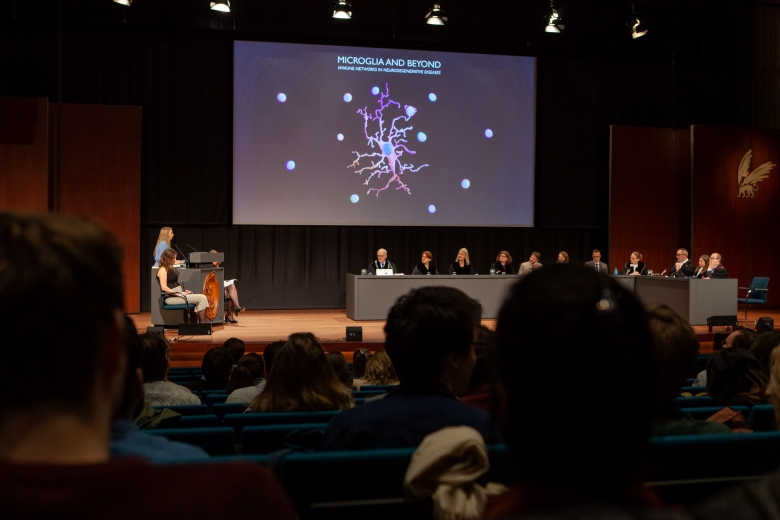“I’m not completely satisfied”, Van Olst says right after her trial defence of her PhD. “In my mind, things often have to be perfect.” Her jet lag is bound to have something to do with it: Van Olst just returned from the US, where she is doing a postdoc at Northwestern University in Chicago. But despite the jet lag and the many scientific terms – from T cells and microglia to the blood-brain barrier and tau proteins – Van Olst manages to explain her research clearly. Her most important discovery? “Immune cells in our blood associate with the progression of Alzheimer’s disease, making the immune system outside our brain a potential target for medical interventions.”
‘Working with a different type of cells felt like cheating’
Spider-like cells
The origins of this discovery date back to Van Olst’s undergraduate research in Groningen, when she studied immune cells in the brain. “Those cells are called microglia and they really are my passion, haha. I find it super interesting that your brain has its own immune system. For example, did you know that about 10 percent of your brain cells are immune cells? Microglia are a kind of spider-like cells that use their arms to constantly scan their environment for pathogens. In addition, they communicate with nerve cells and help create new memories.”
During her PhD research, Van Olst not only studied aging and Alzheimer’s but also the brain disorder multiple sclerosis (MS). For this, she examined brain tissue from deceased donors. She discovered that inflammation of the brain’s protective membrane associates with the progression of MS in humans, and that microglia – the immune cells in the brain – are playing an important role. Therefore, Van Olst concluded that immune cells are crucial in several brain diseases.
Immune cells in brain and blood
During her bachelor’s and master’s, Van Olst studied these immune cells in different brain disorders such as Alzheimer’s and schizophrenia. During her PhD research at VU Amsterdam, Van Olst also examined the immune system in the rest of our body, which consists of a collection of different immune cells. It was thought that the immune system in the brain is closed off from the rest of the immune system, until scientists recently proved otherwise. So Van Olst wanted to know: could immune cells in our blood have something to do with brain diseases? “I actually didn’t want to work on cells other than microglia, it felt a bit like cheating”, she laughs. “But after having worked on this subject for five years now, I realise that the immune cells in your brain don’t work alone. They are part of a huge army of immune cells present throughout your body.”
‘Maybe we can combat brain ageing by keeping the immune system young’
Friend or foe?
In her study, Van Olst showed that factors from the blood of old mice could cause accelerated ageing of the immune system in young mice. That, in turn, could have harmful effects on brain cells. “So maybe we can prevent brain ageing by keeping immune cells in the blood young and healthy.”
In another experimental model for Alzheimer’s disease, Van Olst showed that immune cells in the brain broke down parts of brain cells crucial for making memories. According to Van Olst, this is an indication that the immune system may contribute to memory loss in people with Alzheimer’s disease.
Overtired immune cells
Van Olst also took blood samples from Alzheimer’s patients. “I found that, compared to healthy people, they had a higher proportion of overtired immune cells, even in patients with mild memory loss. This means that the immune system outside the brain may play a role in the early stages of Alzheimer’s disease and could therefore be a target for new therapies.” According to Van Olst, this also shows how important it is to keep your immune system healthy. “Hopefully, my results can lead to new immune therapies that can counter the loss of brain cells in Alzheimer’s patients.”

It is known from previous research that certain genes cause some people to have a higher risk of developing Alzheimer’s disease. Van Olst discovered that something strange was going on with immune cells from Alzheimer’s patients who were carriers of one of these genes. “Their immune cells were more reactive and had a different fat metabolism. We are now investigating if and how this contributes to Alzheimer’s disease.”
From rival to colleague
Van Olst is now doing research as a postdoc in Chicago, in the group of assistant professor David Gate. Here she works on the immunological effects of novel drugs for Alzheimer’s that were recently approved in the United States. And it’s no coincidence that she works in Gate’s group: “A lot of people are doing research on microglia, but hardly anyone is looking at the interaction with blood. David has done pioneering research on that in recent years, including in people with Alzheimer’s disease. I thought: he is doing what I want to do and I want to learn from him. And the nice thing is: we are no longer rivals, but colleagues now.”
The thesis of Van Olst can be found here.
